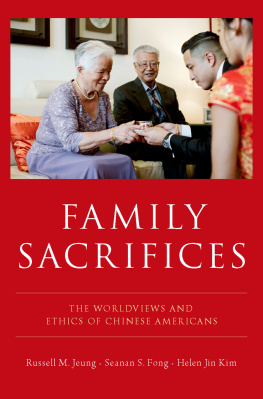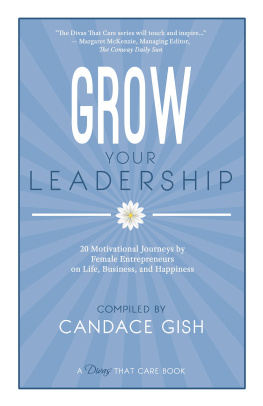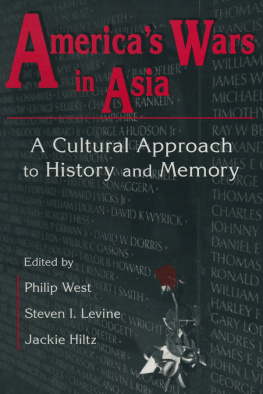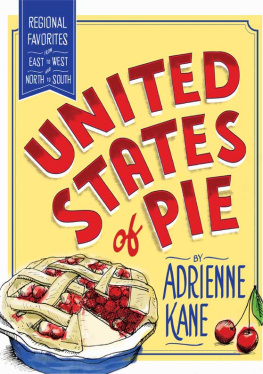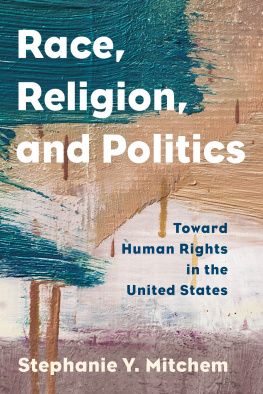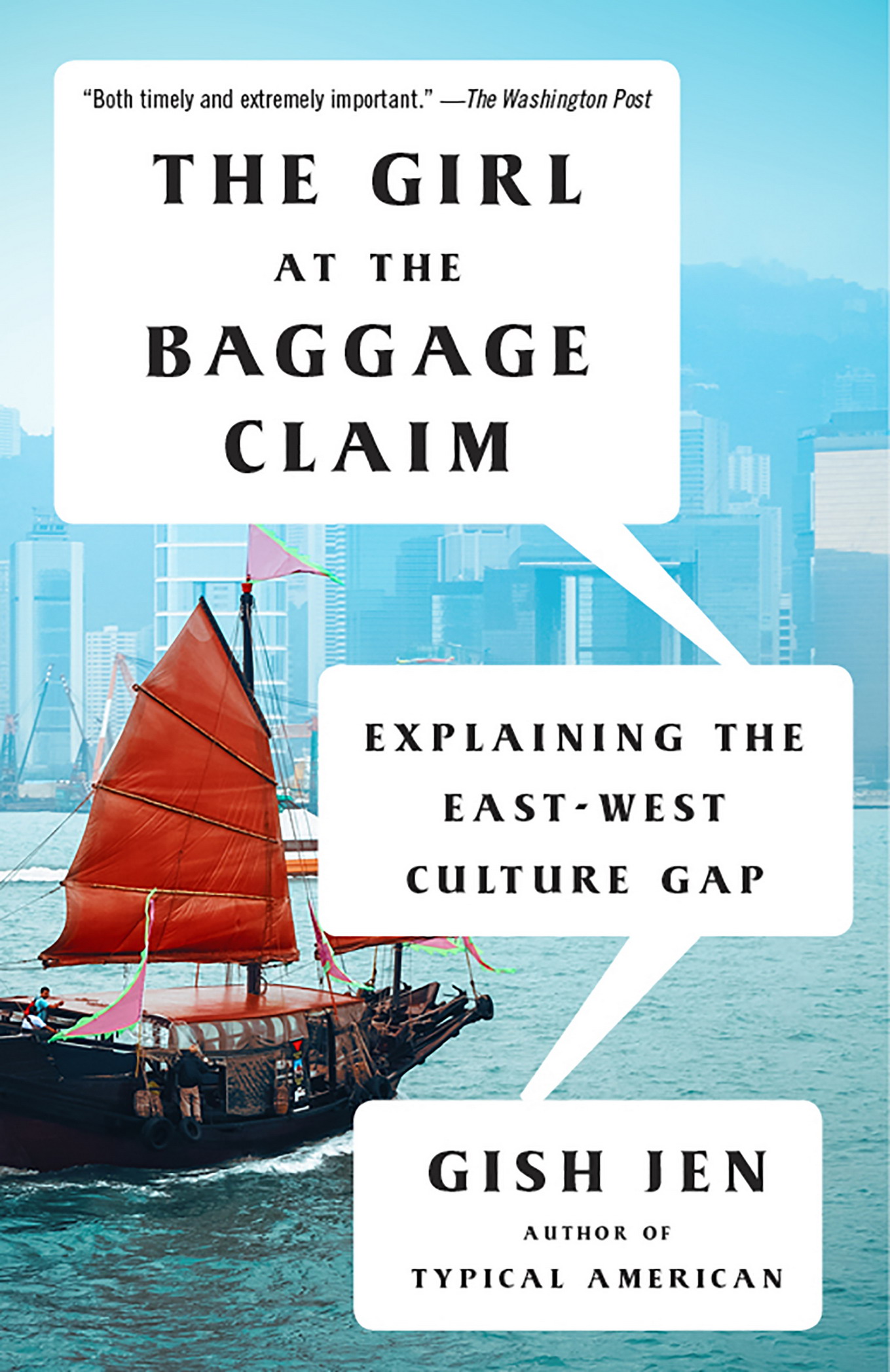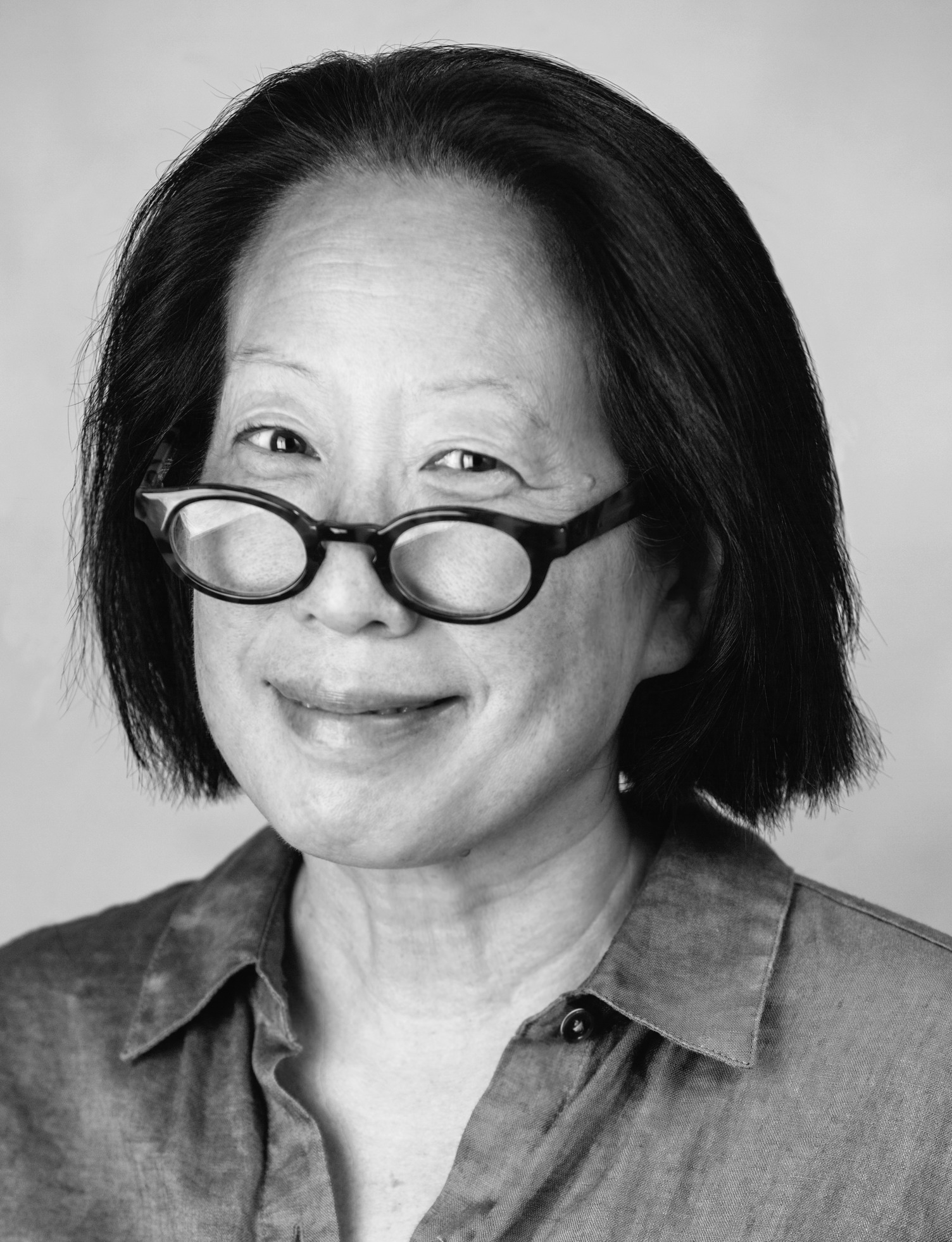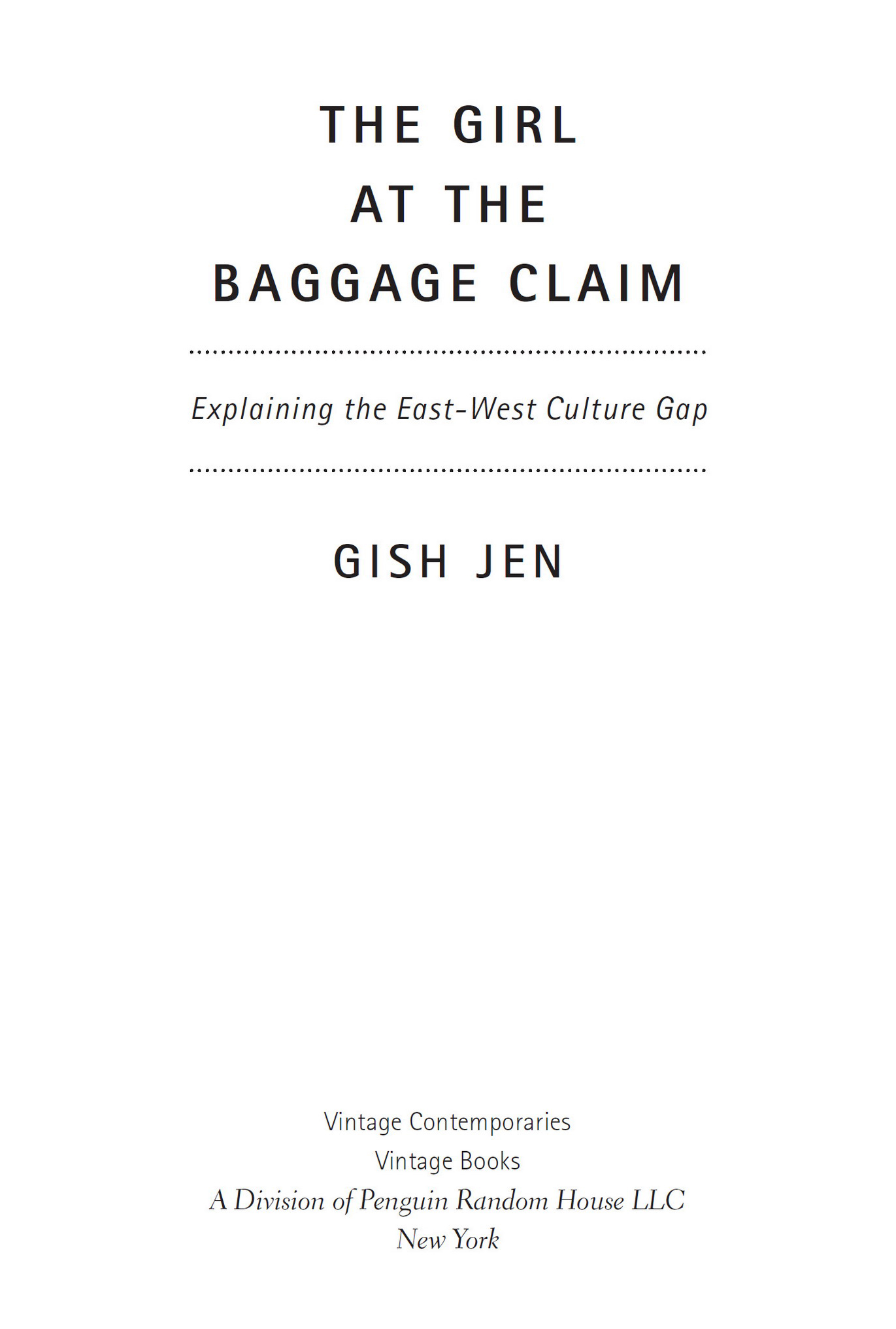Contents
Praise for Gish Jens
THE GIRL AT THE BAGGAGE CLAIM
Fascinating.Rich with examples of the contrast between Asian society and our own.She is onto something that the typical American may become aware of as we bump into people unlike ourselvesfrom other cultures, not limited to Asians.
St. Louis Post-Dispatch
The qualities of carefully rendered fiction shine through in [Jens] book, turning a study of culture and psychology into an engaging narrative. Whether in commerce, diplomacy, or travel, readers can take away memorable insights into how identity and context shape worldviews.
PopMatters
Jen holds up a comprehensive and scholarly mirror to both worldviewsand be warned: Her mirror is honest, and at times provocative.
BookPage
I honestly cant overstate how fascinating I found this book. Its shaken (in the best possible way) some of my basic assumptions about being a Self.
Jason Gots, producer of Big Think
In her trademark lively and witty prose, Gish Jen not only limns non-Western views of the self but also questions whether the Western self is really a natural way to be. A powerful, provocative work.
Michael Puett, professor of Chinese history, Harvard University
Truly eye-opening and thought-provoking.
Eric Lander, president and founding director of the Broad Institute of Harvard and MIT
Gish Jen draws on personal experience, interviews with experts, and her astute reading of both literature and social science to illuminate the crucial question of self in culture.The Girl at the Baggage Claim is remarkable and fluent but, most of all, essential.
Sherry Turkle, author of Reclaiming Conversation: The Power of Talk in a Digital Age
Insightful, far-reaching, and a joy to read.The Girl at the Baggage Claim answered questions Ive been asking my whole life.
David Henry Hwang, playwright of M. Butterfly
This book gives special proof to the belief that our best novelists are also our best psychologists. With characteristic wit and unfailing insight, Gish Jen creates a genre all her ownuniquely universal, deeply serious, and unselfconsciously joyous.
Maryanne Wolf, author of Proust and the Squid: The Story and Science of the Reading Brain
A beautifully observed bookpoignantly captures the personal tussle between independence and interdependence so many of us are caught in. A must-read for anyone navigating the East-West divide.
Priyamvada Natarajan, author of Mapping the Heavens: The Radical Scientific Ideas That Reveal the Cosmos
Gish Jen
THE GIRL AT THE BAGGAGE CLAIM
Gish Jen is the author of four novels, a book of stories, and a previous book of nonfiction, Tiger Writing: Art, Culture, and the Interdependent Self. Her honors include the Lannan Literary Award for fiction, the Mildred and Harold Strauss Living Award from the American Academy of Arts and Letters, and fellowships from the Guggenheim Foundation, the National Endowment for the Arts, the Radcliffe Institute for Advanced Study, and the Fulbright Foundation. She is also a fellow of the American Academy of Arts and Sciences, and lives with her husband and children in Cambridge, Massachusetts.
www.gishjen.com
ALSO BY GISH JEN
Tiger Writing: Art, Culture, and the Interdependent Self
World and Town
The Love Wife
Whos Irish?
Mona in the Promised Land
Typical American
FIRST VINTAGE CONTEMPORARIES EDITION, JANUARY 2018
Copyright 2017 by Gish Jen
All rights reserved. Published in the United States by Vintage Books, a division of Penguin Random House LLC, New York, and in Canada by Random House of Canada, a division of Penguin Random House Canada Limited, Toronto. Originally published in hardcover in the United States by Alfred A. Knopf, a division of Penguin Random House LLC, New York, in 2017.
Vintage is a registered trademark and Vintage Contemporaries and colophon are trademarks of Penguin Random House LLC.
Grateful acknowledgment is made to HarperCollins Publishers for permission to reprint excerpts from Patriot Reign by Michael Holley. Copyright 2004 by Michael Holley. Reprinted by permission of HarperCollins Publishers.
The Library of Congress has cataloged the Knopf edition as follows:
Title: The girl at the baggage claim : explaining the East-West culture gap / by Gish Jen.
Description: New York : Alfred A. Knopf, 2017.
Identifiers: LCCN 2016026243
Subjects: LCSH: East and West.
BISAC: PSYCHOLOGY / Social Psychology. | SOCIAL SCIENCE / Anthropology / Cultural. | BUSINESS & ECONOMICS / International / General.
Classification: LCC CB251.J46 2017 | DDC 306.4dc23
LC record available at https://lccn.loc.gov/2016026243
Vintage Contemporaries Trade Paperback ISBN9781101972069
Ebook ISBN9781101947838
Cover design by Linda Huang
Cover photograph chuyuss/Shutterstock
Author photograph Romana Vysatova
www.vintagebooks.com
v5.1
a
For Ann Close
with love and gratitude
There is no truth. There is only perception.
Gustave Flaubert
Everything that irritates us about others can lead us to an understanding of ourselves.
Carl Jung
Contents
Preface
An Asian girl applies to Milton Academy, a prestigious New England independent school, for admission. Her TOEFL scores are great; her essays are great. The admissions office Skype interviews her; she is great. They enthusiastically send her their signature blue and orange admissions package and look forward to welcoming her.
Since she is traveling alone, the school helpfully sends a person to pick her up from the airport. The girl arrives. But strangely, her English is not as good as the admissions office had been led to expect. Indeed, as time goes on it becomes clear that the girl who has come is not the girl who applied at all.
It is, instead, her sister.
And this is not the only story involving Asia and a certain
Then there are the stories involving New Yorks prestigious science high schools, both of which, the Bronx High School of culture, stupid.
But what does that mean?
A great many Asians and Asian Americansincluding yours trulyare not particularly good at math. In fact, some of us would rather eat raw frogs than derive anything from anything else. Whats more, many of us are not hyper-achievers. Cambodian, Laotian, and Neither was my father particularly self-effacing, by the way. Contrary to stereotype, he loved attention and applause.
Whats more, a great many foreign students are not the girl at the baggage claim. Many are perfectly honest; and non-Asians are not saints. A professor friend recently commented that the difference between her American students and her Chinese students was not whether they plagiarized but whether they knew to hide it; American students, she said, were better about changing the font. And I myself remember the teaching assistants orientation at the University of Iowa in 1981, in which we were all instructed to have the students write something the first day of class and to keep it. That way, we were told, should any of our students plagiarize, we would be armed with a writing sample with which to confront them. (As for the temerity of some students, well, witness the student who handed in Edgar Allan Poes The Tell-Tale Heart as her work for a creative writing class. Even when confronted with the original, she just shook her head, flabbergasted. Well, aint that the darnedest thing, she said.)



